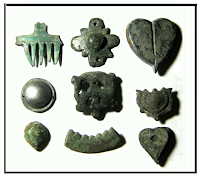1.3: The Problem
Unlike the situation in most countries, the collecting of archaeological artefacts is not illegal in Britain. It is claimed that current policies "provide an opportunity for individual finders to demonstrate how, if undertaken responsibly, artefact hunting can add value to archaeology, and lead to a better understanding of the past" (Fischer 2016, 3).
In general, however, artefact hunting has long been seen seen in most other parts of the world as a negative phenomenon
'the looting that is ravaging the material remains of the ancient world [...] there is an increasingly profitable market in archaeological antiquities, a market which threatens to undermine future research and the dissemination of its findings to the public. Unless checked, archaeological plunder today may well destroy our ability to inform ourselves and future generations about the past' (Miller in 1982).As Elia put it in 1997:
'Archaeological sites, the material remnants of our human past, are finite and nonrenewable cultural resources that are under constant threat from environmental forces, development activities, warfare, vandalism, and looting'.The latter is the problem that is of concern, while the others are due to external forces, over which we have less control, the exploitation of the archaeological record as a source of collectables is something that can be regulated both from outside (antiquities legislation and sanctions) and within (responsible collecting). It is the latter that Elia advocates:
The destruction of archaeological resources by looters is an international crisis and threatens to obliterate the world’s cultural heritage and our ability to understand past cultures. The scale and intensity of the looting problem can be estimated by studying the extent of site destruction in countries of origin and by investigating the sources of antiquities held by collectors. Finding a solution to the problem of looting will require a focus on the demand side of the market (i.e., collectors) instead of the traditional focus on the supply side (looters, dealers)Some problems specific to the use of metal detectors to find collectable items are concisely presented in the Historic England guidelines 'Our Portable Past' which says [p. 16] of the hobby:
Historic England recognises the potential value of using metal detectors, on land and beneath the sea, where they:Obviously, addressing these issues is one of the tasks of creating a responsible approach to artefact hunting.
- extend public knowledge and understanding; and
- enhance the efficiency of metal artefact retrieval during fieldwork.
To achieve this good equipment, clearly stated and effective techniques, and experienced operators are necessary.
Historic England recognises that in certain circumstances metal detectors can add value by the retrieval of metal artefacts in circumstances of ‘last resort’, that is where those artefacts are otherwise likely to be lost or destroyed.
However, it is also recognised that metal detecting can be problematic because it can result in:
- removal of artefacts from their contexts with serious loss of information;
- damage to related archaeological deposits;
- partial recovery of assemblages which often neglects non-metal finds, again with loss of information;
- unreported discoveries leading to an accumulated loss of knowledge;
- misreporting of find spots leading to inaccurate information. [...]
- Particular issues arise from metal-detecting rallies.
- The potential loss of archaeological information through non-recording and the export without record of finds pose serious problems for the Historic Environment Sector.
Bibliography:
Hartwig Fischer 2016, 'Foreward' in The Portable Antiquities Scheme Annual Report 2016, British Museum, London, p. 3.
Ricardo J. Elia 1997, 'Looting, collecting, and the destruction of archaeological resources', Nonrenewable Resources June 1997, Volume 6, Issue 2, pp 85–98.
Historic England 2018, 'Our Portable Past: Guidance for Good Practice' (3rd edition, 20 February 2018)
 Tamara Kroftova comments:
Tamara Kroftova comments:"Without a responsible approach to preserving the information value of the archaeological resource, artefact hunting and collecting are merely selfish and destructive activities, no matter how much collectors would like to pretend otherwise."



Comments
Post a Comment